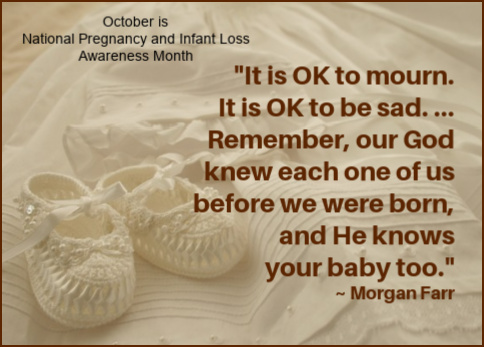Please note: This article is about losing a child to miscarriage or infant loss. While the author has been careful in how she expresses her thoughts, it still may trigger deep, painful feelings in those who have experienced this loss. Know that Morgan's goal—and mine—is only to encourage, and not bring more pain.
In this month set aside to remember those who have experienced infant loss, Morgan Farr writes this Grief UPGRADE with the desire to help grieving mothers, and also those who may need insight in helping moms process their grief.

Morgan quotes Franchesca Cox:
"A mother is never defined by the number of children you can see, but by the love that she holods in her heart."
I (Dawn) have wept with women who lost children in miscarriage or sudden death infant syndrome—and also with the babies' grandmothers! There is no easy way to comfort them, but God wants us to "mourn with those who mourn." I am glad Morgan is tackling this tough topic.
Morgan continues . . .
If you have ever lost a child to miscarriage or infant loss, my heart breaks for you. Though I now have four wonderful children, I have walked in your shoes three different times.
You are not alone in this journey.
In fact, many women have walked in our shoes—one in four pregnancies end in miscarriage.
Throughout history, miscarriage and infant loss have been taboo subjects, but that is all changing. In the fall of 1988, President Ronald Regan designated October as National Pregnancy and Infant Loss Awareness Month. And in 2002, October 15 was named "Pregnancy and Infant Loss Awareness Day."
All of that is great, but what do you actually do?
- After you have lost a baby, how do you function?
- How do you commemorate the importance of this life without being in a constant state of mourning?
I totally get that. A lot of the language used around miscarriage is ambiguous or antiquated. I struggled with it too.
In military life, acronyms are just the way we speak, so I use "EMBER" to help grieving mothers process grief—to help them remember the child they lost.
E — EXPRESS
After a miscarriage, you are going to feel a LOT of things... and nothing.
I had days where I was almost irrationally angry, days where tears poured down my face all day, and days where I felt absolutely nothing. All of those feelings are entirely normal, and it is important to express them.
This is where community comes in. Galatians 6:2 says,
"Carry each other’s burdens, and in this way you will fulfill the law of Christ.”
Finding a grief support group can be a wonderful way to talk to other women that just "get it." Many hospitals offer free grief support groups. There are also nonprofits that help women during this time as well.
If you aren’t comfortable in a group, find someone you can talk to.
You NEED to talk through these emotions in a safe place where you can be vulnerable. Allow others to help you carry this burden.
M — MEMORIALIZE
You may or may not have a grave to visit due to the nature of your miscarriage and how far along you were.
- If you have a gravesite and are able to visit it and place flowers there, that can be helpful in the healing process.
- A lot of women wear a necklace or a charm bracelet that might have the birthstone of the baby.
- Some people keep framed sonograms.
- Some people plant a tree or a bush to memorialize the baby that was lost.
This is a completely personal choice—up to you.
Also, realize that how you memorialize may need to change as you process your grief.
I couldn’t look at the sonogram for months after the miscarriage, so I kept them in a drawer until the pain wasn't as bad.
B - BALANCE
After you have a miscarriage, you are often expected to get back to "normal" life relatively quickly. In many places there isn’t even time off for a miscarriage as there would be for another kind of death.
It is crucial that you check in on your system and make sure you are balanced.
- If you are struggling emotionally, reach out.
- If your body doesn’t feel right, call your doctor.
- If you have difficulty sleeping or eating, get help.
You went through something traumatic. You do NOT have to pretend like everything is ok.
You figure out what you need and make it happen.
E — ENLIGHTEN
People often don’t know how to relate to a woman who has had a miscarriage.
The problem is, they just need to be enlightened that you are still mourning and you need time.
So I am going to teach you the phrase that changed the game for me. Ready?
“I had a miscarriage _____ days/weeks/months ago; I need some time.”
If you aren’t ready for (insert any activity that you aren’t ready for here) yet, use this phrase.
Enlighten those around you about what you can and cannot deal with right now.
R — REMEMBER
Choosing how you remember your little one is entirely up to you. This is a personal decision, and you need to do what works best for you and your family.
I chose to remember the babies that God called home by naming them.
On the anniversary of the miscarraige, we have cupcakes, and we remember the siblings that my kids didn’t get to meet—using their names.
This gave me a great sense of CLOSURE, and helped me to feel like I wasn’t the only one who would remember their names.
Psalm 34:18 says,
"The Lord is close to the brokenhearted and saves those who are crushed in spirit."
It is OK to mourn. It is OK to be sad.
Using EMBER to remember and to memorialize your little one can help you heal.
Remember, our God knew each one of us before we were born, and He knows your baby too.
 Morgan Farr is a Texas-loving, succulent-cultivating, book nerd and aspiring author. Stationed in Philadelphia, Pennsylvania, this Army wife is learning to train dogs, developing her four young children, and tackling homeschool life—all while moving all over the country. Morgan believes in integrity, authenticity, and grit. Although she writes for many different publications, you can almost always find Morgan’s most recent ramblings on her blog.
Morgan Farr is a Texas-loving, succulent-cultivating, book nerd and aspiring author. Stationed in Philadelphia, Pennsylvania, this Army wife is learning to train dogs, developing her four young children, and tackling homeschool life—all while moving all over the country. Morgan believes in integrity, authenticity, and grit. Although she writes for many different publications, you can almost always find Morgan’s most recent ramblings on her blog.
Graphic adapted, courtesy of Callie Reagan at Pixabay.